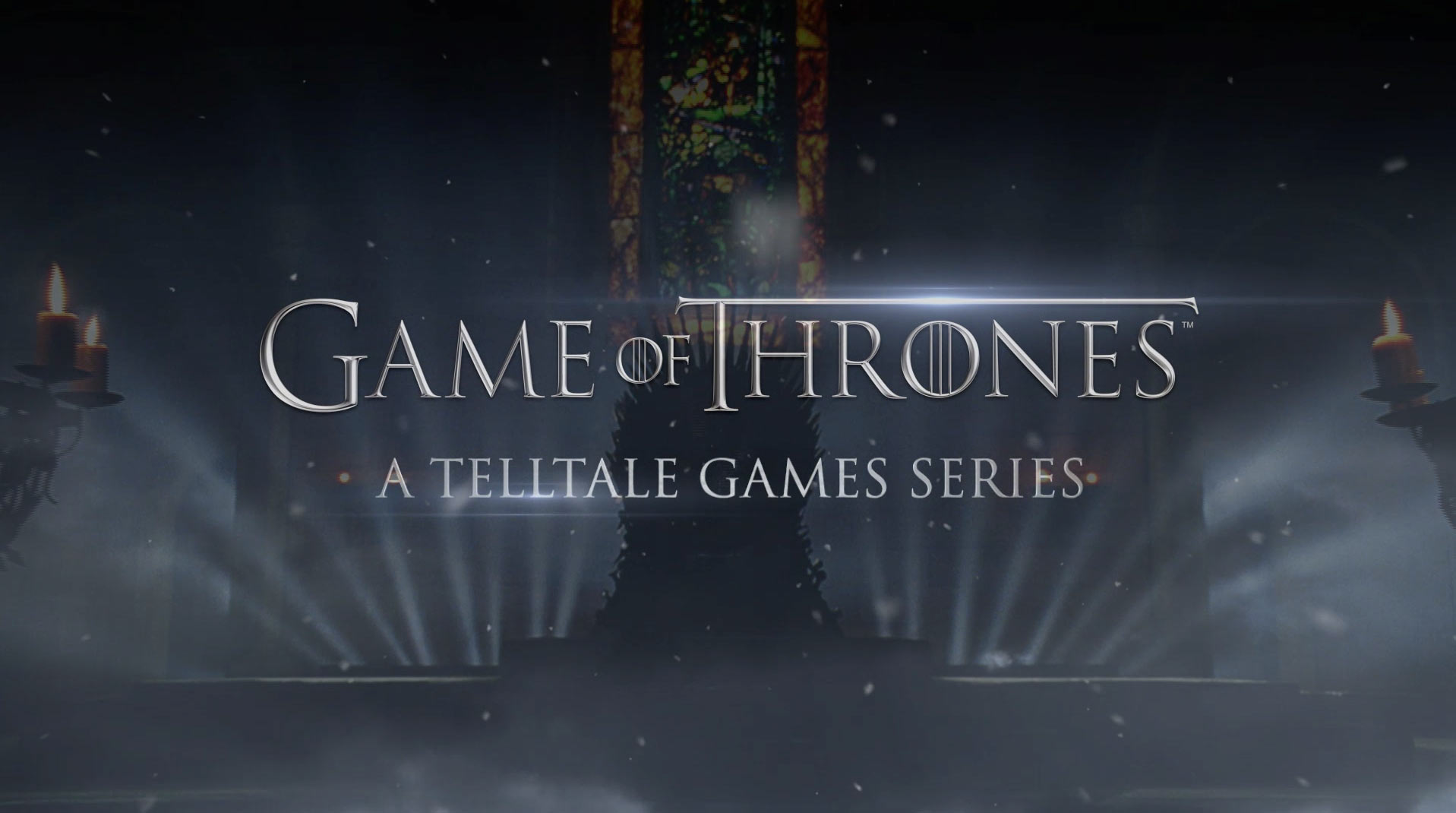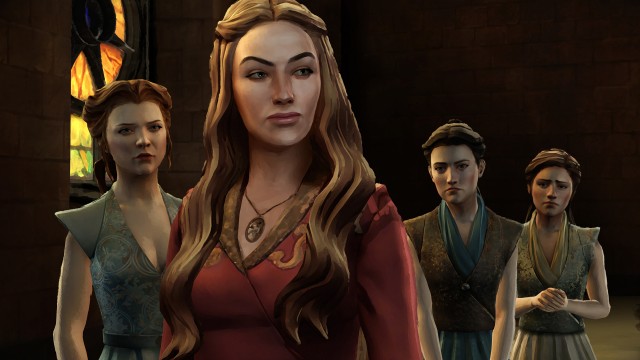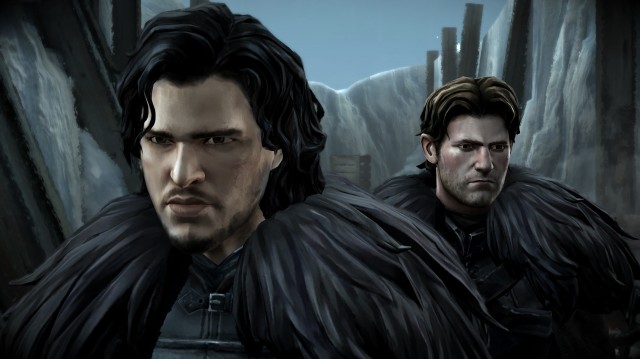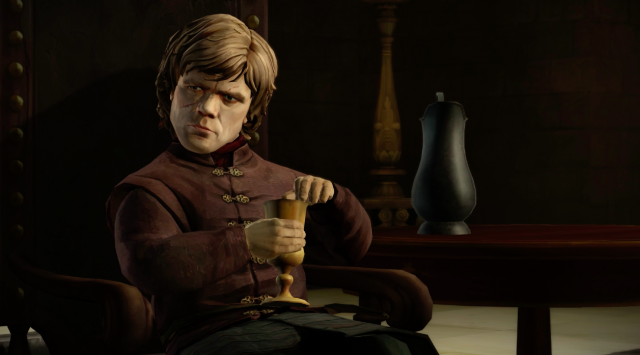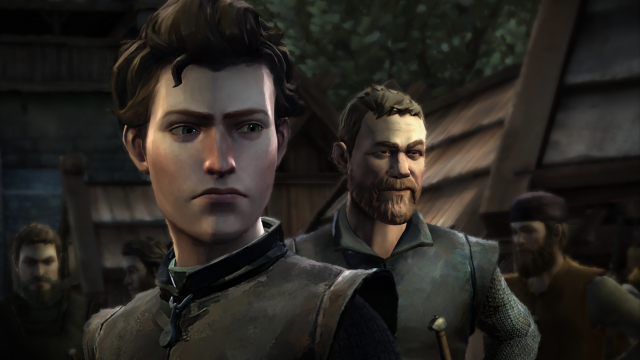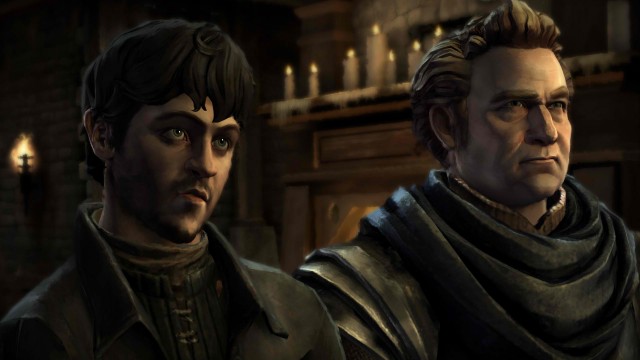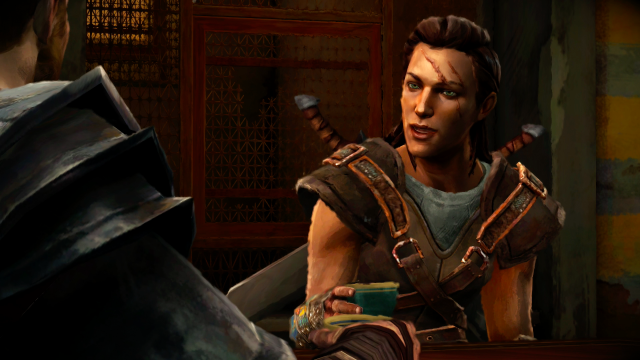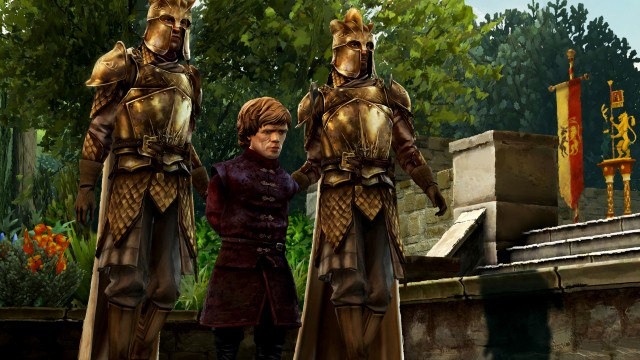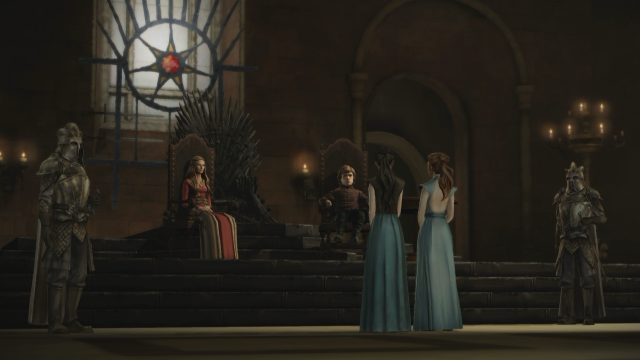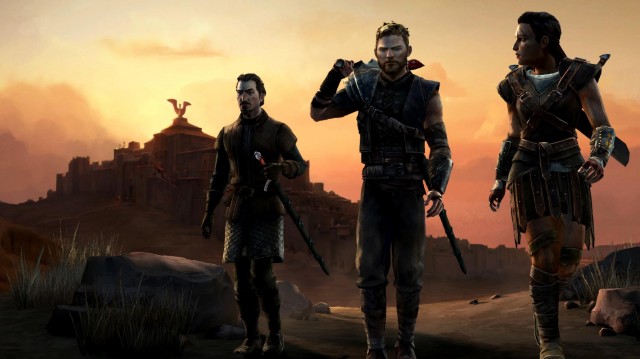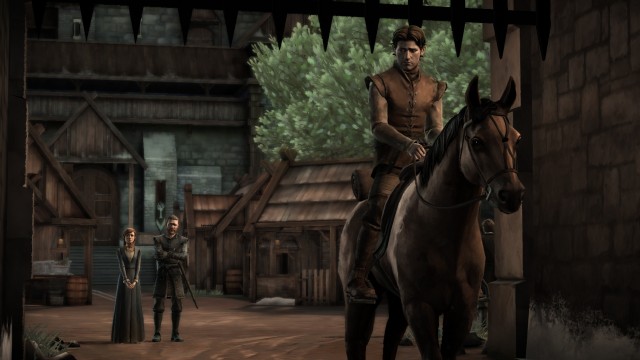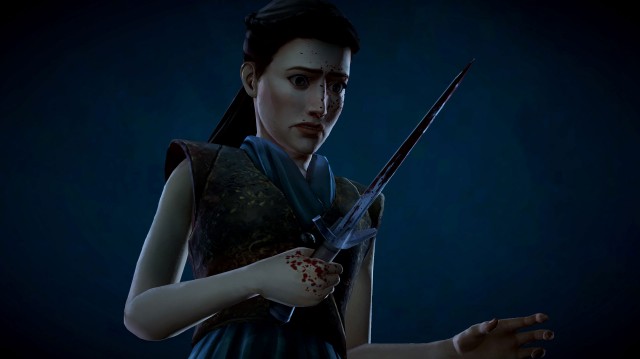When you play the Game of Thrones, you either win, or you die. Thanks to Telltale’s new episodic Game of Thrones adventure game, you’ll quite literally get that chance!
After several lacklustre Game of Thrones video games from other developers failed to impress gamers, the storytelling masters at Telltale Games are trying their hands at the license, and the result is Game of Thrones: A Telltale Games Series, a six-episode narrative-driven adventure game that recently wrapped its debut ‘season’. Set within the world of the highly beloved HBO television series (not the ‘A Song of Ice and Fire‘ source novels), Telltale’s Game of Thrones unfolds from the perspective of House Forrester, a noble sect of Stark loyalists who have not previously had any reference in the television series, though they were mentioned in one of the George R.R. Martin source novels, A Dance with Dragons. As five different personalities within House Forrester, players must struggle to survive after the fall of the Starks from the television series, as higher forces on the continent of Westeros begin to turn their heads to the house’s now-unprotected and valuable supply of Ironwood, vital to military production.
As you can imagine, the concept of Telltale’s Game of Thrones feels like an attempt to re-capture the runaway success of Telltale’s highly acclaimed The Walking Dead game from 2012, something that the company has pretty effectively replicated within a follow-up second season for that game, as well as their Fables-inspired fantasy-noir adventure game, The Wolf Among Us. Game of Thrones reliably manages to recapture the dark and brutal choice-driven appeal of those entries in its own debut season of six episodes as well, particularly when it so beautifully emulates the presentation and tone of the HBO series that inspired it.
That said however, Game of Thrones doesn’t quite reach the same incredible highs of The Walking Dead or The Wolf Among Us, being a good Telltale series that suffers somewhat from a decreased feeling of having real impact on the storyline in the long term, and a sense of petering out towards a rather unsatisfying conclusion, which plays out very similarly, regardless of the choices you’ve made. Fans of the HBO series and/or its source novels will still want to seek out Telltale’s Game of Thrones, which remains the best video game inspired by the works of George R.R. Martin to date, though it won’t mark a new high point for Telltale’s recent works.
Since it’s now rooted in the world of a live-action television show, rather than the graphic novels that Telltale’s past few offerings sprung from, Game of Thrones deviates a bit from the company’s usual cel-shaded art style. Instead of the vibrant cel-shaded look, Game of Thrones resembles something of a watercolour portrait-esque aesthetic in its environmental backdrops and character models, combined with character likenesses that are recognizable as human, though with exaggerated, more hyper-expressive features. It feels very Telltale, and it’s a nice medium that’s struck between real and surreal elements in the game’s atmosphere, making Game of Thrones feel like it undeniably exists within the world of the HBO series, though still ekes out its own unique and appealing art style that helps it to stand apart.
Thanks to the Telltale Tool engine, the graphics scale well between the game’s many platforms as well. The PC/Mac versions have the best visual fidelity and performance on even mid-range rigs, let alone high-end ones, and the rather modest system requirements of Game of Thrones allow the game to run and function pretty easily, even on budget gaming computers. The PS4 and Xbox One versions keep graphical pace with the PC/Mac versions pretty well, with both running at native 1080p resolution, though the framerate feels choppier on Xbox One especially, with only the PC/Mac versions seeming to be able to maintain a consistent 60fps framerate at nearly all times, assuming their recommended requirements are met. For the smoothest game experience, you should probably play on a computer over a console, if you can.
With that said, if you’re stuck with a console, the game is still plenty playable, and still looks very appealing. The PS4 version seems to be the best of the console builds, though the Xbox One version looks just as sharp, even if its performance is a bit less reliable. As for the Xbox 360 and PS3 builds, even though they cap at an inferior resolution in contrast to the PS4 and Xbox One builds, they still look great for the standards of the last-gen consoles, though they suffer from especially poor framerate performance and visual bugs at times. Both of these seem to be an issue on all four consoles, with the odd instances of improper texture loading even showing up on PC/Mac occasionally, though at least current-gen hardware seems to suffer from these problems noticeably less. None of this is game-breaking, mind you, but it can be pretty distracting, should you be playing Game of Thrones on one of the platforms that it’s less optimized for especially.
The only time that the visual blemishes and hiccups may become more intrusive to the game experience is if you’re playing one of the portable renditions of Game of Thrones on iOS or Android devices, though recent patches have fixed most of these issues at present. Certain episodes of the game seem to stutter pretty badly at times on iOS devices in particular though, which can occasionally disturb swiping and touching prompts during gameplay at worst. Again, these mobile ports are still functional, especially post-patch, though the cost of being able to take the game on the go comes with the condition of the least stability in the experience, with the mobile ports sometimes even crashing outright at worst, though this happens pretty rarely.
Nonetheless, Game of Thrones is still well put together from a visual standpoint, even if the game manages to maintain immersion on some platforms significantly better than others. The world of the HBO series is replicated remarkably well, and players will easily feel like they’re part of the experience of the show. It’s just too bad that the effectiveness of so many beloved Game of Thrones environments coming to life has to be hampered by some unwelcome visual glitches and performance hiccups during certain sequences.
Game of Thrones goes to as much great lengths in the audio to replicate the feel of the HBO series as the visuals, including packing in an authentic soundtrack that would feel right at home in any episode of the television series. The heavy war drums and melancholic strings suit the game very well, and feel very true to the style of Game of Thrones, contributing to Telltale’s offering feeling like it’s perhaps more authentic than any prior Game of Thrones video game released to date.
Likewise, the sound effects are also well-rendered, and often strike with shocking brutality. Even in a narrative-driven game, the stakes of violence and bloodshed are captured brilliantly in Game of Thrones, and every gruesome turn of battle sounds realistically squeamish, even in a game with an art style that doesn’t aim for pure realism. As with many Telltale games, sound effects are sparingly used, to preserve the feeling of a story that’s being recounted to the player, rather than a gritty experience that aims to place the player into something that feels fully grounded. This continues to work to the benefit of the game however, especially when the audio mixing makes sure that subtlety and agony are both effectively conveyed in equal measure.
By far the highlight of the audio however is the voice acting, which, as usual for Telltale, is done excellently. A new cast of leads meshes very well with recognizable faces from the HBO series, including Peter Dinklage’s Tyrion Lannister, Lena Headey’s Cersei Lannister, Emilia Clarke’s Daenerys Targaryen, Iwan Rheon’s Ramsey Snow, Kit Harrington’s Jon Snow, and Natalie Dormer’s Margaery Tyrell. Whether you play for cunning, valor, wisdom or justice, both the new and recognizable personalities wonderfully convey your chosen discipline (or lack thereof), and they, above anything else, will immerse players in the blood-soaked worlds of Westeros and Essos, as the video game medium has never offered before!
Regardless of your gaming pedigree, or your familiarity with Telltale games, Game of Thrones is easy to pick up and understand, at least in terms of playing it. Players will take control of one of five leads from House Forrester, performing simple actions and choosing flexible narrative prompts, all of which could potentially steer the outcome of the story. Even if you’ve barely touched a video game before, the game is remarkably easy to play on any platform, so even non-gaming fans who simply love the HBO series can easily pick up Game of Thrones and enjoy it.
In fact, the only inaccessible element of the gameplay is probably the huge amount of lore and history that the HBO series has already established. If you haven’t seen most of the television show, or at least read the source novels, you probably won’t know who most of the legacy personalities and events are, or what’s driving most of the ones that weren’t explicitly invented for Telltale’s game. This is a game that seems to primarily market itself to Game of Thrones fans over anyone else, which is fair enough, though you’ll need to already know your way around Westeros and Essos, if you want any understanding of what’s driving the game’s overall conflict. Likewise, if you’re considering this game as an entry point to the world of Game of Thrones, don’t, because it’s not very effective at introducing you to the world, if you haven’t previously experienced it on HBO, or in prose.
Nonetheless, even the uninitiated can have at least some level of appreciation for the struggle of a noble family trying to protect their estate from invaders, who want to steal their key crop of Ironwood. Most of the game will simply involve players picking choices for any of the personalities they take control of, which can be done by pressing a single button on consoles, clicking the choice you want on computers, or tapping the choice you want on mobile devices. The user interface is always incredibly simple, regardless of your choice of platform.
As for the personalities you control, perspectives will shift between several of the Forrester siblings, as well as the house squire, Gared Tuttle. Not all of the characters live in the Forrester stronghold of Ironrath either. For example, Asher Forrester fights as a mercenary in the desert continent of Essos, alongside his comrade-in-arms and best friend, Beskha. Likewise, Mira Forrester is a handmaiden to queen-to-be, Margaery Tyrell in the royal halls of King’s Landing. All of the leads are likable, and you will genuinely want to save them and their house, which is the core of the gameplay appeal for the player. Even far from the Forresters’ home of Ironrath, the decisions you make, and both the allies and enemies you build and motivate, will directly affect the status of House Forrester on the home front.
Or, that’s the idea anyway. While some of your decisions do have noticeable impact on the narrative, Game of Thrones unfortunately seems to grant less storytelling flexibility than The Walking Dead or The Wolf Among Us most notably. Even when you appear to make the right choices, the game will strong-arm you into the same negative scenarios much of the time, to the point where repeat playthroughs will have the player noticing that the game assumes that you made a certain choice, even when you didn’t, such as a character referencing you ‘missing’ in battle, even when you try and refuse to fight, for example. This decreased feeling of control over the storyline drags down Game of Thrones after the initial playthrough especially, and it’s odd that the game doesn’t prepare more potential scenarios to address the player’s actions.
To elaborate, the game’s choices are sound in concept, and some of them are truly painstaking to make, especially when it seems like any option will lead to misfortune or violence. The problem is that it feels like events still often play out the same way, even as dialogue and character opinions of your personalities may change. For example, if you make certain choices, a certain ally may turn on you. If you make different choices, a different person will turn on you… But someone will always turn on you. You see? Regardless of who that enemy you make is, the fundamental event is unchanged. Likewise, it doesn’t matter if you’re reckless or cunning with any potential scheming you may or may not do, since, if the game wants you to be found out, you’ll be found out, and there’s no way around it, regardless of how well or poorly you’ve covered your tracks.
This all contributes to a feeling of players being a more passive presence in the story than the game would have you believe. Players have some influence, but ultimately, it doesn’t feel like enough influence to matter. The Walking Dead and The Wolf Among Us saw potentially huge narrative changes, depending on how you chose to play. In Game of Thrones however, since you’re dealing with personalities that are still lead characters in a beloved television series, and scenarios that are still locked on the historical path of said series, you’ll ultimately feel more helpless to sway events, and will too often feel like a bystander in what’s still a great story overall, but is still a story that feels more rigid than Telltale usually offers.
Nonetheless, the brutality and warfare that defines Game of Thrones still manages to be strong. Even in a game that you play with just a few button/keyboard taps, mouse clicks, or finger taps/swipes, depending on your chosen platform, you’ll feel the intensity of battling for survival throughout the series, and particularly the sometimes stomach-turning actions that the player is forced to execute. Again, even the most uninitiated of gamers can easily play the game, so the experience is never interrupted by needlessly complicated prompts or actions. That doesn’t make slicing through someone or crawling through a mess of corpses any easier from a psychological standpoint though, among the other brutal things that Game of Thrones’ story sometimes demands.
It is possible to die in Game of Thrones as well, though death doesn’t really present much consequence, as with most Telltale games. Occasionally, a failure to complete combat actions and quick-time events, the cause of potential death, can result in minor consequences, though most of the time, you just immediately re-load the sequence and try again. Game of Thrones isn’t an action game after all, and doesn’t really demand any skill. It’s more about immersing yourself in a beloved fantasy world, and seeing how your decisions influence it, or attempt to do so. Like I said, it’s a let-down that the game hampers your decision-making more often than it should.
Regardless, the game will still tally your major decisions, along with Telltale’s other efforts, and will recount them for you as you complete each of the six episodes. Each episode has five major branching decision paths, whereupon the conclusion of the episode will show you the percentage of players who made the same decision as you in that scenario, though obviously, this requires that you’re connected to the internet. This doesn’t directly affect gameplay, but it remains interesting to see if you fall in the general consensus, or made a more unexpected decision in the heat of a certain situation.
Once again though, this all would have meant more, had the player been given more power to steer the course of the plot. Many events are bound to remain static and consistent, though the fact that the template of the story is so rigid and so rarely changed by your choices, gives Game of Thrones an aftertaste of disappointment from a gameplay perspective. It has the same accessibility as the other Telltale games, and conveys the feeling of being in the Game of Thrones universe with aplomb, but rather than feel like a driving force that’s pushing everything forward, players will too often feel like a guest that’s forced to comply with someone else’s rules, merely being given the illusion of choice, rather than the power of choice.
Game of Thrones starts out brilliantly in its first episode, and carries on pretty well for the next three. It’s the fifth and sixth episodes that end up feeling like weak links in this debut season, since that’s when your decisions seem to start mattering the least, especially if you made certain decisions in earlier episodes that seal your narrative fate all the more. Seeing as this point in the season’s plot is when everything approaches a climax, that’s not really ideal.
Also problematic is the fact that the game’s story is mostly bound to end the exact same way, regardless of how you chose to try and preserve House Forrester. Even when you make drastically different decisions on repeat playthroughs, the ending feels too far out of the player’s control, and simply seems to serve as sequel bait for a ‘Season Two’ which, in fairness, Telltale has already announced as being in development.
Even before that though, players will have to try and keep up with the robust and demanding lore of Game of Thrones, which will be lost on those who aren’t already fans, like I said. If you are a Game of Thrones fan, you’ll be pleased to see how well the feeling of bloody, intriguing political warfare is replicated in the game, which feels very true to the world of the television series especially. If you’re not an established fan of Game of Thrones though, you’ll frequently have no idea what’s going on, who is who, or why you should care, among the personalities beyond House Forrester. A greater effort to establish the show’s personalities within the story for newcomers that are looking to get their feet wet with the Game of Thrones franchise here certainly wouldn’t have gone amiss!
For fans that are curious, the game takes place in a mostly disconnected scenario that starts around the conclusion of Season Three of Game of Thrones, then spans most of the background of Season Four, and concludes around the start of Season Five. You won’t have to worry about the game spoiling the show, beyond one hefty spoiler from Season Four, and the violent Red Wedding from Season Three that kicks off the game, though like I said, a knowledge of the show is strongly recommended to enjoy the game, so that you won’t be confused when names and events from the show are referenced by key personalities.
As it stands, the overall story comprising Telltale’s Game of Thrones is well done, if inflexible with the player’s choices. The journey is still worth it for fans, providing a look at a formerly unseen corner of the HBO series’ universe, though Telltale has certainly spun more impactful stories, especially when those highlight stories demanded more thought and narrative engagement from the player.
As Telltale’s latest attempt to translate a beloved franchise to their masterful brand of narrative-driven adventure games, Game of Thrones feels like a half-successful experiment in its debuting six episodes. The presentation and overarching narrative of the game is incredibly well done, and fits in beautifully with the universe of the HBO series that inspired it. From a gameplay perspective however, Game of Thrones is a let-down, since it ultimately doesn’t present as much freedom to the player as it claims to.
There’s also the problem of the gameplay being accessible, but the story being impenetrable to people who aren’t already well familiar with the personalities and lore of Game of Thrones, or at least its source novels. This game is a disappointingly poor jumping-on point for people who are looking to get into the franchise, and don’t want to start by spending a heap of cash on DVD sets, or an HBO subscription. If you’re already a fan, then you can go right ahead with enjoying the Telltale game, but you’ll likely need to brush up on the television series, before you can approach the game with any real level of engagement.
Ultimately, there’s room to improve for Telltale’s Game of Thrones, but the game is still the best adaptation of George R.R. Martin’s stories to the video game space yet, and is still a good enough game to merit a look for fans of the source material. You’ll already need to enjoy the bloody history of Westeros before you’ll get anything out of the experience, but if nothing else, the story of the Forresters is a grimly entertaining one, even if you’ll wish you could more directly influence it.

